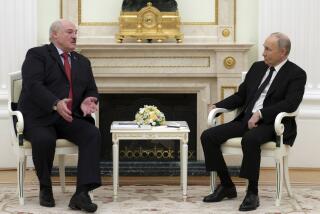Yeltsin Backs Down, Will Negotiate With Rebellious Chechen Leader : Unrest: Soviet press criticizes the Russian Federation president for the way he handled ethnic problem.
- Share via
MOSCOW — Bowing to the inevitable, Russian Federation President Boris N. Yeltsin backed down Tuesday from his imposition of a state of emergency in the Chechen-Ingush region, a rebellious Muslim enclave in Russia.
The Soviet press, commenting on the first difficult test of Yeltsin’s ability to solve ethnic problems, criticized him for initiating a policy so ineffectual and dangerous that it had to be immediately repealed.
The Russian Federation legislature voted overwhelmingly Monday not to approve the emergency measures that Yeltsin had ordered to control political turmoil in Chechen-Ingushetia, where Russian officials contend that power has been illegitimately seized by Gen. Dzhokar Dudayev.
Yeltsin had employed tough measures in the enclave, declaring a state of emergency last Friday and sending Russian troops and a personal envoy to take control in his name, because he was determined to prevent the breakup of the vast Russian Federation.
Presidential spokesman Pavel I. Voshchanov said Yeltsin will do everything he can to implement the legislature’s resolution, which calls for political methods, not the use of force, to solve the power struggle in the region.
In an interview with the Soviet Interfax news service, Voshchanov said Yeltsin will agree to negotiate with Dudayev, who is seeking greater autonomy and perhaps complete independence for Chechen-Ingushetia. It is one of 21 autonomous regions in the Russian Federation that were created to give large ethnic minorities more control over local affairs.
In Grozny, the Chechen capital, Dudayev gloated about his victory by instigating criminal proceedings against three Russian officials--Vice President Alexander V. Rutskoi, Interior Minister Andrei Dunayev and Ruslan I. Khasbulatov, the chairman of the Russian legislature who is also a Chechen.
“The three must be punished,” Dudayev, a 46-year-old retired Soviet air force general, said in an interview with the Komsomolskaya Pravda newspaper.
Dudayev said the crisis has worked to consolidate his support in the region, instead of ending his rule as Yeltsin had planned. “We would not have reached such heights for quite a time yet,” he said, “if not for the provocations from Russia.”
Soviet President Mikhail S. Gorbachev, speaking at a news conference, criticized the attempt to use force in the Chechen-Ingush region but attributed the decision to Yeltsin’s advisers.
“These comrades made haste and concluded that political and constitutional methods had been exhausted and, in my view, impermissibly overestimated the importance of force in settling this complex conflict,” Gorbachev said.
Gorbachev applauded the Russian legislature for its move and gave his approval to the political means now being used to try to solve the problem.
“The Chechen crisis was the first serious test of the strength of the Russian state,” the independent newspaper Nezavisimaya Gazeta wrote. “It seems that hopes were not justified that the Russian leadership, unlike the federal one, would pursue a balanced, calculated and future-oriented nationalities policy.”
Emil Pain, director for the Center for Ethnological Studies, writing in the same paper, commented that Yeltsin had failed if his purpose in introducing a state of emergency was to calm secessionist groups and prevent the disintegration of the Russian Federation. “Political forces in the republics seeking full independence regard Yeltsin’s decree as a signal for action,” he said.
Pravda, the Communist Party newspaper, seemed to relish Yeltsin’s failure, saying of Russian legislators: “Try as they might to save Yeltsin’s face, the task proved impossible. Beyond a doubt, Dudayev is currently the top dog and one can only pray for a miracle hoping he accepts the conditions set by the Supreme Soviet.”
But on a grimmer note, Pravda stressed that the country cannot survive another such blunder.
More to Read
Sign up for Essential California
The most important California stories and recommendations in your inbox every morning.
You may occasionally receive promotional content from the Los Angeles Times.










